
Poco was an American country rock band originally formed in 1968 after the demise of Buffalo Springfield. Guitarists Richie Furay and Jim Messina, former members of Buffalo Springfield, were joined by multi-instrumentalist Rusty Young, bassist Randy Meisner and drummer George Grantham. Meisner quit the band while they were recording their first album, Pickin' Up the Pieces, though his bass and backing vocal parts were kept in the final mix. He was replaced by Timothy B. Schmit in 1969, and Messina left in 1970 to be replaced by Paul Cotton. The line-up would change numerous times over the next several decades, with Rusty Young being the only constant member. A reunion of the founding members occurred in the late 1980s-early 1990s, and the band continued in some form through 2021, though they retired from active touring in 2013, with Young citing health concerns as the primary cause of his retirement. Young died from a heart attack in April 2021.

Paul Richard Furay is an American musician and Rock & Roll Hall of Fame member. He is best known for forming the bands Buffalo Springfield with Stephen Stills, Neil Young, Bruce Palmer, and Dewey Martin, and Poco with Jim Messina, Timothy B. Schmit, Rusty Young, George Grantham and Randy Meisner. His best known song was "Kind Woman," which he wrote for his wife, Nancy.

Deliverin’ is the third album, and first live album, by the American country rock band Poco. Jim Messina quit the band in October 1970, prior to the release of the album. WBCN DJ Charles Laquidara wrote the liner notes.

From the Inside is the third studio album by the American country rock band Poco. The band was reportedly unhappy with it following its release. This album was the first to include new member Paul Cotton as lead guitarist, who replaced Jim Messina. Messina would go on to form his partnership with Kenny Loggins.

A Good Feelin’ to Know is the fourth studio album by the American country rock band Poco. The title track became the band's most recognizable tune from its early days. However, the album did not do as well commercially as expected, discouraging Richie Furay, who would leave the band after the release of the band's next album Crazy Eyes.

Seven is the sixth studio album by American country rock band Poco. It is the first album they made after leader Richie Furay left the band. The front cover was designed by Phil Hartman. On this album the group experimented with a harder rock sound on some of the tracks.

Poco Live is the tenth album, and second live album, by the American country rock band Poco. The material for this album had been recorded for Epic Records shortly after the Cantamos album, but it was not released until over a year later, after Poco's switch to ABC Records and success with the Head over Heels album. The release of this album produced confusion in the marketplace over whether this or Rose of Cimarron was Poco's newest album, helping sales of Poco Live and hurting sales of Rose of Cimarron.

Inamorata is the sixteenth studio album by the country rock band Poco, released in 1984. Featuring guest spots by former members Timothy B. Schmit, Richie Furay and George Grantham, this would be the last album that the band would record for Atlantic Records. After this the original line up would reform for the 1989 release Legacy.
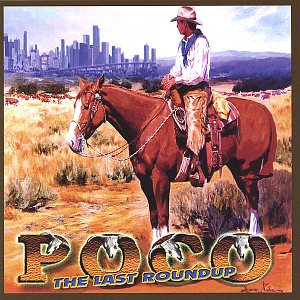
The Last Roundup is the 21st album, and third live album, by the country rock band Poco.
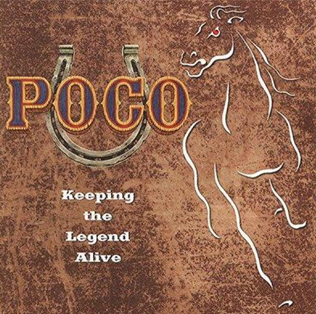
Keeping the Legend Alive is the 22nd album and 4th live album by the country rock band Poco. It was re-released in 2006 under the title "Alive In The Heart Of The Night." It includes original members Richie Furay, *George Grantham and Rusty Young, Paul Cotton who replaced Jim Messina in 1970 and Jack Sundrud a member since the 1990s.

The first in a long line of compilation albums, The Very Best of Poco features highlights from the band's career from 1969–1974. When released on CD in the late 1980s, the album omits two tracks originally on the album, "Railroad Days" and "Skatin" for space reasons. Both were reinstated for the remastered BGO import edition released in 1998.
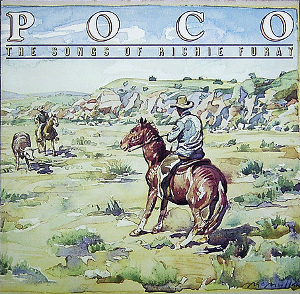
Poco: The Songs of Richie Furay is a compilation album consisting of songs by Richie Furay during his tenure with the band Poco, released in 1980.

Poco: The Songs of Paul Cotton is a compilation album consisting of songs by Paul Cotton of the band Poco, released in 1979.

The Best Of is a Spanish compilation of the American band Poco, released in 1980.

The Forgotten Trail (1969–74) is a 2-CD collection of the greatest hits of Poco recorded during the group's work for Epic Records, which included their first eight albums.

The Very Best of Poco is a 1999 compilation album of songs by the band Poco.
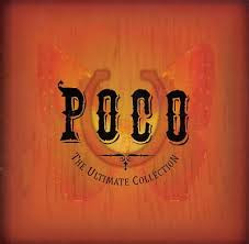
The Ultimate Collection is a compilation album by the American band Poco, released in 1998.
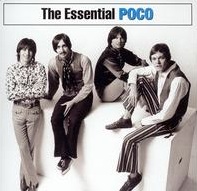
The Essential Poco is a compilation album of recordings by the band Poco released in 2005 as part of Sony BMG's Essential series.
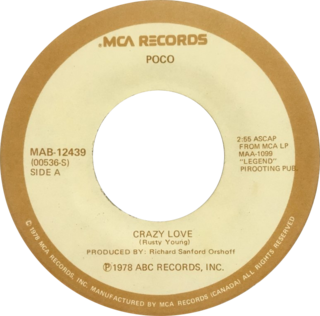
"Crazy Love" is a 1979 hit single for the country rock group Poco introduced on the 1978 album Legend. Written by founding group member Rusty Young, "Crazy Love" was the first single by Poco to reach the Top 40 and remained the group's biggest hit, with a special impact as an Adult Contemporary hit, being ranked by Billboard as the #1 AC song for the year 1979.

















